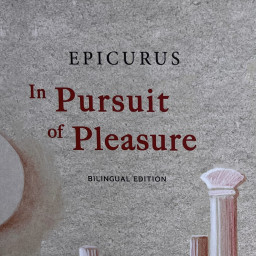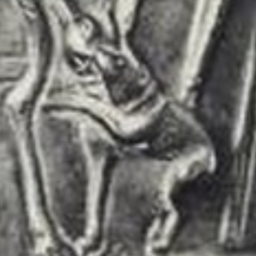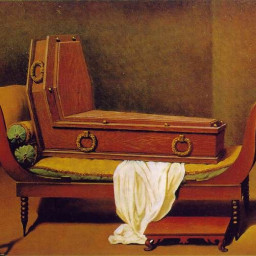Ethics - How To Live As An Epicurean
Latest Lucretius Today Podcast: #287 - "The Fear of Pain Is Overrated, But Cicero and Epicurus Disagree As To Why." | Latest Blog Article: Principle Doctrine XIV - Analyis And Application | Things To Know When First Reading Epicurus: The Epicurean Paradigm Shift | Featured Videos | Community Standards And Posting Policies
Regularly Checking In On A Small Screen Device? Bookmark THIS page!
Welcome to the EpicureanFriends Forums page. Please be sure that all posts conform to our policies for posting as linked at our Terms of Use page. Scroll down to navigate through the full forum. Or you can: Search by forum Tag -or- Search by Forum Shortcuts Page -or- check out our List of Featured Threads -or- from any sub-forum you can return to the main Forum Board List. Not sure where to post? Read our guidance on where to post.
List Of Frequently Used Forums
- Ancient Epicurean Texts (300 BC to 300 AD)
- The Lucretius Today Podcast and other Projects
- Study Resources and Activism
- Physics - The Nature of the Universe
- Canonics - The Tests of Truth: The Five Senses, Anticipations, and Feelings of Pleasure and Pain
- Ethics - How to Live As An Epicurean
- Uncategorized Section
- Epicurean Books, Articles, and Videos (1500's - Present)
- Epicurean Historical Figures - Biographies of Epicureans from Epicurus To The Present
- Comparisons With Non-Epicurean Philosophies
- History, Locations, and Customs Relevant to Ancient Epicureans
- Epicurean Symbolism in Art, Music, Literature, and Poetry
- Level 03 And Above Discussions
- EpicureanFriends Zoom Meetings
In this section we discuss Epicurean Ethics and how to live as an Epicurean in a world where there are no supernatural gods and no life after death.
- Threads
- 107
- Posts
- 1.3k
- Last Posts
-
 Cassius
CassiusJune 26, 2025 at 4:22 PM
- Threads
- 11
- Posts
- 201
- Last Posts
- Threads
- 29
- Posts
- 175
- Last Posts
-
 Cassius
CassiusFebruary 9, 2025 at 8:56 PM
- Threads
- 47
- Posts
- 306
- Last Posts
-
 Bryan
BryanFebruary 1, 2025 at 6:10 PM
The Term Pleasure Includes Bodily as well as Mental Pleasures Such As Tranquility, Meaningfulness, Katastematic, Kinetic, Etc. Likewise The Term Pain Includes All Bodily and Mental Pains.
- Threads
- 36
- Posts
- 673
- Last Posts
- Threads
- 2
- Posts
- 27
- Last Posts
-
 Cassius
CassiusJuly 1, 2025 at 8:50 AM
- Threads
- 6
- Posts
- 30
- Last Posts
-
 Cassius
CassiusOctober 4, 2023 at 12:20 PM
- Threads
- 6
- Posts
- 71
- Last Posts
- Threads
- 16
- Posts
- 48
- Last Posts
-
 Kalosyni
KalosyniMarch 13, 2025 at 10:19 AM
- Threads
- 30
- Posts
- 289
- Last Posts
-
 Pacatus
PacatusNovember 20, 2024 at 4:35 PM
- Threads
- 16
- Posts
- 129
- Last Posts
-
 Cassius
CassiusFebruary 2, 2025 at 7:21 AM
- Threads
- 3
- Posts
- 4
- Last Posts
- Threads
- 12
- Posts
- 77
- Last Posts
VS 63 and why we do not pursue only "necessary" desires.
- Threads
- 9
- Posts
- 213
- Last Posts
-
 Bryan
BryanMay 2, 2025 at 11:44 AM
- Threads
- 5
- Posts
- 119
- Last Posts
For discussion of daily life as an Epicurean which do not fit into any of the pre-set categories in Epicurean Lifestyle.
- Threads
- 57
- Posts
- 518
- Last Posts
-
 Cassius
CassiusJune 10, 2025 at 7:24 PM
- Threads
- 22
- Posts
- 179
- Last Posts
-
Root304
November 9, 2024 at 5:30 AM
This is one of the questions we get asked most frequently. If you're curious about this, post your own thread here!
- Threads
- 11
- Posts
- 100
- Last Posts
- Threads
- 5
- Posts
- 67
- Last Posts
-
 Patrikios
PatrikiosSeptember 28, 2024 at 5:46 PM
- Threads
- 22
- Posts
- 115
- Last Posts
-
 Cassius
CassiusJune 29, 2025 at 3:39 PM
- Threads
- 17
- Posts
- 158
- Last Posts
-
 Don
DonMay 2, 2025 at 6:07 AM  Pacatus
PacatusNovember 5, 2023 at 10:50 AM
- Threads
- 7
- Posts
- 23
- Last Posts
- Threads
- 24
- Posts
- 195
- Last Posts
-
 Kalosyni
KalosyniFebruary 13, 2025 at 8:28 AM  Martin
MartinDecember 20, 2024 at 8:30 PM
- Threads
- 17
- Posts
- 149
- Last Posts
Post here your everyday casual comments and frustrations on dealing with a non-Epicurean world. Here you can "blow off steam" about the craziness of religious attitudes (how "everything" is god's will," no matter how ridiculous; how people who die are happy in heaven - so why don't we all commit suicide?) or other common viewpoints (procrastination, "keeping up with the Jones's," etc) that conflict with Epicurean views. But please - remember the "Not Neo-Epicurean" rules, and don't veer off into "politics."
- Threads
- 9
- Posts
- 106
- Last Posts
- Threads
- 4
- Posts
- 60
- Last Posts
-
 sanantoniogarden
sanantoniogardenJuly 1, 2025 at 5:10 PM
- Threads
- 3
- Posts
- 32
- Last Posts
- Threads
- 1
- Posts
- 43
- Last Posts
No! Epicurus was not uneducated: the real philistines are those who ask us to go on studying till old age the subjects that we ought to be ashamed not to have learned as children.
- Threads
- 2
- Posts
- 3
- Last Posts
- Threads
- 1
- Posts
- 5
- Last Posts
- Threads
- 1
- Posts
- 1
- Last Posts
- Threads
- 2
- Posts
- 14
- Last Posts
-
 Pacatus
PacatusNovember 19, 2024 at 12:17 PM

